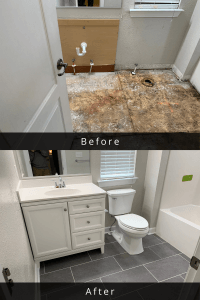
It’s something no one wants to think about: sewage cleanup. But when disaster strikes and you find yourself facing a sewage backup in your home, it’s imperative to act fast and reach out to professional sewage cleanup services. The potential problems go much deeper than a mess and a bad smell. Sewer backup situations should be treated as emergencies because they could contain viruses, bacteria, or other microbes that can cause serious illness.
Depending on the severity of the problem, you may be able to take some steps to limit the sewage damage, salvage your belongings, or even take care of the problem yourself. Remember that sewage cleanup is a difficult and dangerous job, so don’t take it on unless spill is small and easy to manage.
A serious sewage problem is a daunting task, but you don’t have to face the issue alone.
Types of Sewer Backup Water
The water you see after a sewage backup or spill can be in one of three categories: clean water, gray water, or black water. The sewage cleanup process will depend on what type of water is present.
Clean Water
Clean water describes water coming from a clean source like a tap or supply line. The best scenario is if the water that floods as a result of the sewage backup is clean. While it can, of course, cause water damage, clean water is the least likely to pose a threat to your health. Still, you need to deal with these kinds of spills efficiently because clean water can turn into grey or black water if left to sit untouched.
Grey Water
Gray water is contaminated water with some bacteria. Sources include washing machine or dishwasher overflow and overflow from toilets with just urine. Gray water can pose a threat to your health and cannot be left alone.
Black Water
Black water is the most dangerous type of floodwater. It is deeply contaminated and may contain raw sewage, chemicals, or microbes. Sewer and septic backups, including those stemming from a sewage pump issue, can often cause black water flooding.
A professional can determine what type of water you’re dealing with and devise a corresponding plan of action to perform a safe cleanup. All three types are serious, so don’t think that just because your sewer backup problems created flooding of clean water or gray water that it isn’t a big deal. It’s better to proceed with an abundance of caution in each case, and that’s why sewage cleanup services can be so beneficial.
Professional Sewage Cleanup Services
Professional help with sewage cleanup is always advisable, but it is even more critical in the following cases: the spill affected multiple rooms, you aren’t sure when the spill happened and how long the water has been sitting, or if a member of your household is especially vulnerable to health problems causes by contaminants in the water.
If water has been contaminated by sewage backup, it should be treated as an emergency and dealt with as soon as possible. Jenkins Restorations has teams that are available 24/7, 365 days a year to help you when disaster strikes. Don’t deal with a septic backup alone. From gross contaminated water to potential negative health effects, a sewer cleaning project is a monumental task better left to professionals. Choose sewage cleanup services from a professional provider you can trust instead!
What Causes Sewage Backups?
There are multiple reasons why your sewage can back up into your sinks, tubs, and floors. Regardless of the reasoning for the backup, our sewage cleanup experts can make things right.
Blockages are often caused by:
- Soil settling
- Misaligned joints
- Root intrusion
- Pipe collapse
- Grease accumulation
- Flushed items
The most common culprits for sewage backups are clogged pipes, tree roots penetrating sewer lines, broken or collapsed sewer lines, and obstructions in the main sewer line. Soap, grease, and debris buildup are typically responsible for clogged pipes, while tree roots can infiltrate the sewer lines and cause blockages. Broken or collapsed sewer lines can also result in blockages, leading to sewage backup in your home. Additionally, a blockage can occur in the main sewer line due to debris such as dirt, leaves, or even concrete.
Always remember, even if the water looks clear, there may be invisible germs present. To ensure a proper and appropriately cleaned and disinfected job, rely on sewage cleanup experts.
Is it Safe to Stay in a House with Sewage Backup?
Experiencing a sewage backup in your home can have severe implications for your health. The presence of sewage can contaminate your private well water, as well as pollute surface water sources such as lakes, ponds, rivers, streams, and reservoirs utilized for drinking water.
